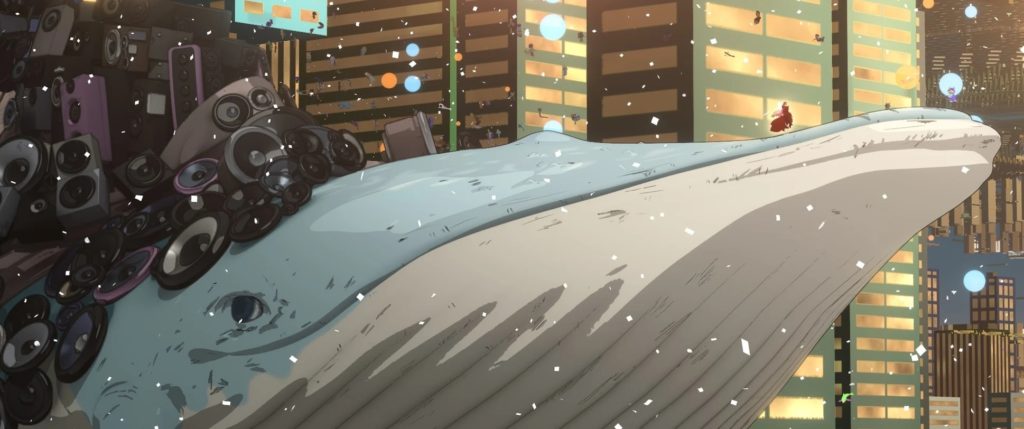August 6, 2023
·
0 comments
By Jonathan Clements.
There’s a moment in Mamoru Hosoda’s Belle (2021), early in the film, where his heroine is standing on a giant floating whale loaded with huge speakers, belting out a song as she drifts through a future city. It looks suitably iconic, and I was sure that it was a reference to Macross: Do You Remember Love? (1984), in which Lin Minmei, the perky Chinese pop idol, brings a fleet of alien invaders to its knees by standing on the prow of a battleship and singing a song about love.
Because life at Anime Limited propels one into direct contact with the people who make the movies, I had the chance to ask Mamoru Hosoda myself, only to discover I’d got it all wrong.
“No,” he replied. “Jonathan, I wonder if you have ever heard of an anime called Gunbuster? Because there’s this scene in Gunbuster where the mecha comes out and stands with its arms folded on the prow of the ship, and that’s such a fantastic moment in anime, and that’s what I was trying to evoke with Belle on the back of that whale.”
Hosoda and I are very similar in age, so we were both impressionable students when Gunbuster was released in 1988, 1989, and he said that Gunbuster was a show he very much enjoyed when he was young and starting out in animation. It’s clearly something that left an impression on him for him to be tipping his hat to it 32 years later.
One gets a sense with overseas fans of Gunbuster that even though Gunbuster derives so much of its material and weight from references to earlier shows, many of those references are unnoticed by its viewers, who don’t see the resonances or the in-jokes. Gunbuster rising out of the ship, with its arms folded, has become an iconic moment in anime history, it’s called the Buster Pose or the Gaina-stance and it’s referenced repeatedly in subsequent Gainax anime, but it doesn’t originate here.
In fact, it is itself an hommage, to Getter Robo, and the appearance of the G-Dragon robot, but to know that, you’d probably have to have been a thirteen-year-old Japanese boy in 1974… which I am not sure any of us actually were. And if you were, you probably don’t need me here telling you this.
As for Gunbuster’s attacks, they, too are hommages to old anime and tokusatsu shows, mainly from the 1970s. The Buster machine itself is a design combo deriving largely from Getter Robo and Space Runaway Ideon, while the Buster Beam is a mixture of the Getter Beam from Getter Robo with the Emerium Ray from Ultra Seven (1967).
But wait, there’s more. The Buster Collider for example, is a nod to the Mach Collider from Super Robot Mach Baron (1974). And of course, owing to the fact that the Gunbuster isn’t completed in early episodes, we have this time limit on the battles, which derives in part from Ultraman. Brad Warner, who used to work at Tsuburaya, once told me that Tsuburaya came up with that device not only for dramatic tension, but because it locked them into a limited amount of special effects battle footage per episode. So that’s a lovely little touch, this draining battery timer, which of course Gainax would use to full dramatic effect later on, again, in Neon Genesis Evangelion.
As for Lin Minmei, she gets a little cameo in Gunbuster herself. Blink and you’ll miss her as the camera tracks across the girls’ locker room, taking her bra off, because Gainax.
Jonathan Clements is the author of Anime: A History. He might like Gunbuster a bit. Gunbuster: Aim for the Top is released in the UK by Anime Limited.
